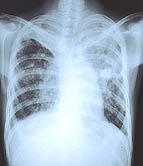Health system savings, health benefits with therapy for contacts of patients with multi-drug resistant TB
WEDNESDAY, June 17, 2015 (HealthDay News) — Fluoroquinolone therapy for contacts of individuals with multi-drug resistant tuberculosis is associated with cost savings and reduced incidence of multi-drug resistant tuberculosis, according to a study published online April 27 in the American Journal of Respiratory and Critical Care Medicine.
Gregory J. Fox, M.D., Ph.D., from the Montreal Chest Institute at McGill University, and colleagues examined the potential benefits, risks, and cost-effectiveness of fluoroquinolone therapy to prevent tuberculosis in contacts of individuals with multi-drug resistant tuberculosis. Using decision analysis, costs and outcomes were estimated for no therapy versus a six-month course of daily fluoroquinolone therapy.
The researchers found that, compared with no therapy, fluoroquinolone therapy was associated with health system savings, reduced incidence of multi-drug resistant tuberculosis, and lower mortality. Fluoroquinolone therapy of infected contacts would also result in reduced incidence of multi-drug resistant tuberculosis with acquired fluoroquinolone resistance.
“In our model, fluoroquinolone preventive therapy resulted in substantial health system savings and in reduced mortality, incidence of multi-drug resistant tuberculosis, and incidence of acquired fluoroquinolone resistant disease as well as improved quality of life,” the authors write. “Fluoroquinolone therapy remained cost saving with improved outcomes even if the effectiveness of therapy in preventing multi-drug resistant tuberculosis was as low as 10 percent.”
Full Text (subscription or payment may be required)
Copyright © 2015 HealthDay. All rights reserved.








